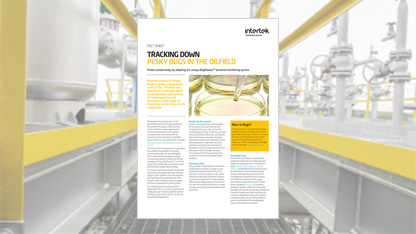Microbial monitoring tracks and trends the problematic microorganisms found in various systems, allowing for well-informed planning and risk management.
Proactive Microbial Monitoring to Protect Your Assets
Oilfield microbial monitoring is a critical service across industries where microorganisms pose a persistent threat to infrastructure integrity through issues like microbiologically influenced corrosion (MIC), water quality degradation, biofilm formation, biomass blockages, and reservoir souring, leading to chemical depletion and commodity loss.
Detecting microbial problems too late or delaying corrective measures can result in serious system failures, operational disruptions, and even the need for emergency remedial actions such as extensive material replacement or complete process shutdowns.
At Intertek, our Total Quality Assurance experts develop custom microbial monitoring programmes and provide a wide range of microbiological testing solutions tailored to your specific system needs. All oilfield microbial monitoring services are conducted according to industry-recognized standards, including AMPP (NACE) TM0194 for traditional methods and AMPP (NACE) TMO212 for advanced molecular microbiological techniques.
When you need a custom microbiology solution, whether for biocide efficacy trials, biofouling prevention strategies, or broader microbial risk management, our specialized microbiology services ensure optimized chemical usage and enhanced asset protection.
Microbiological services
To ensure best protection of an asset, a holistic monitoring plan is recommended with complete appraisal of an installation or site for existing or potential future infrastructure and asset integrity risks. This bespoke system audit highlights the presence of potentially detrimental microorganisms and is the first step in tackling any problems they may cause.
In the oil and gas industry microorganisms such as sulphate-reducing bacteria and archaea, and methanogens, among others, are known to cause microbiologically influenced corrosion (MIC). MIC has been attributed to many failures in the past and represents a persistent challenge for operators. Often occurring in injection, production and firewater systems, MIC also affects pipelines and processing facilities. In extreme cases, accelerated corrosion can cause significant damage to the inside of storage tanks and flow lines.
Refined oils (diesel, lubricants, etc.) are also vulnerable to microbial (bacteria and fungi) growth, which can greatly affect their quality, cause blockages and compromise the integrity of pumps, cam shafts and fuel injectors.
Additionally, unchecked bacterial activity can deplete nitrite-based corrosion inhibitors within heating and cooling medium systems and impact heat exchanger efficiency.
Microbiological surveys are conducted by our experienced professionals to highlight areas of your systems that may be vulnerable to microbial growth and activity. The data can then be used to determine suitable approaches to prevent or alleviate MIC and other microbial related issues in susceptible areas.
Following an in-depth field survey, or desk study, high-risk areas that should be monitored regularly can be identified. Established through decades of extensive in-house development of microbiological testing methods and management of high frequency datasets, Intertek designed a web-based monitoring system, BugTracker. This is designed to assist your business in reducing the risk of asset failure, safeguarding the health of personnel, and optimising expenditure.
Providing continuous microbial monitoring and control, BugTracker allows you to predict the likelihood of problems developing and address existing damage before it becomes unmanageable. Its early-warning system alerts you to deviation from agreed key performance indicators, while customised system diagrams highlight developing issues, allowing for timely remedial action. Furthermore, a dedicated account manager will help track samples, trend data and ensure that important information, reports, and data records are stored and readily available in one central location.
Non-routine microbial testing is also occasionally required, and we can provide advice on testing options and supply a vast range of consumables from Microbiology Media Test kits to Molecular Sampling Kits. and microbial monitoring from our innovative laboratories, to help you better manage the threat from microbiological impact on your operations.
Microbiological contamination of fuel storage and distribution systems is a common problem throughout the Oil & Gas Industry. Once a system has been heavily contaminated, it can be extremely difficult to regain microbiological control. Therefore, proactive maintenance and monitoring regimes are recommended to minimise bacterial proliferation within the storage and distribution system.
Maintaining good quality fuel is important, especially when systems are in remote locations, such as offshore facilities. Microbiological growth predominately occurs at the fuel/water interface or on internal tank walls and can severely affect fuel quality. Routine monitoring includes testing for bacteria, yeast and mould as well as fungal fragments. Presence of these can result in reduced fuel quality due to fuel degradation over time, but also cause filter blockages. Where water has accumulated and left in fuel tanks presents risk to tank integrity as microorganisms such as SRB can grow within these environments, which are often associated with corrosion. To protect against these risks a typical fuel suite test will quantify bacteria, yeast, moulds, fungal fragments, moisture content and total suspended solids, as well as a visual inspection.
With over 30 years of leadership in oilfield microbiology innovation and testing services, Intertek is your trusted partner for accurate microbial analysis, risk mitigation, and a full suite of related exploration and production testing services.
With our global reach and world-class centers of excellence, we can provide the effective approaches you need to maintain the health and productivity of your business.



